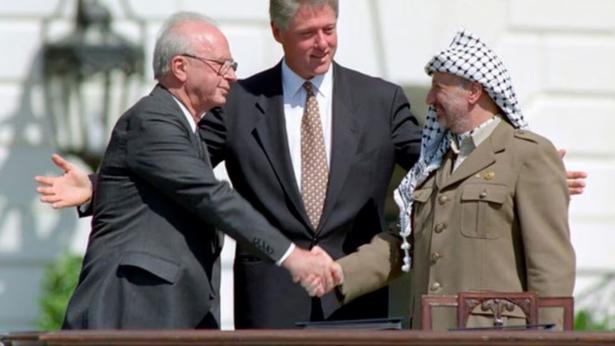On November 4, 1995, peace in the Middle East seemed within reach.
Israel and Palestine had signed the Oslo Accords, in which they recognized each other and moved towards a solution in which both peoples could coexist. Palestinian leader Yasser Arafat; Israel's Prime Minister Yitzhak Rabin and his Foreign Minister Shimon Peres received the Nobel Peace Prize.
But some wanted to avoid that peace at all costs.
And they would achieve it.
That November 4, Rabin led a massive event in support of the peace agreements in the center of Tel Aviv. He spoke before more than 100 thousand enthusiastic young people. “Let's make peace,” were his last words. When he was leaving the place, an ultranationalist Jew named Yagar Amir murdered him with two shots.
Amir triggered the revolver, but before others had loaded their hands with gunpowder.
After the signing of the Oslo Accords, fundamentalist rabbis branded Rabin a “traitor” and issued a din rodef against him , an authorization to assassinate him.
Benjamin Netanyahu, then leader of the opposition, was the keynote speaker at two protests against the agreements, under the chant of “Death to Rabin.” He also led a march staged as a funeral procession for the prime minister, complete with a hanging rope and a coffin.
Rabin was succeeded by his minister Peres, who called elections. These seemed like a formality: the polls gave him a twenty-point advantage over Netanyahu.
Then Hamas intervened. The Islamic fundamentalist group also considered the peace agreements a betrayal, and launched a campaign of terrorist attacks in the weeks before the elections. 59 Israeli civilians were murdered in buses, squares and shopping centers.
The attacks were successful: terrified, the Israelis turned their backs on Peres and elected Netanyahu, who promised to be the strong man who would stop terrorism. He won the elections by less than 29,000 votes, formed a government with Orthodox and ultranationalist groups, and did exactly what Hamas wanted: derail the peace process.
Extremists also prevailed in Palestine. The collapse of the peace process and widespread corruption reduced the credibility of Fatah, Arafat's party, and strengthened Hamas. After a civil war between both groups, Palestine remained divided to this day. The West Bank is governed by Fatah, and the Gaza Strip by Hamas.
Bitterly, the BBC called Rabin's assassination “the most successful assassination in history.” “An act of violence that completely achieved its objective.”
Amir assassinated Rabin. Netanyahu and Hamas buried his legacy. More than 11,500 Palestinians and more than 2,600 Israelis have died since then.
This 2023, the assassins are again on their way to success. Hamas terrorists infiltrated Israel to carry out a horrific massacre, executing in cold blood more than a thousand defenseless men, women, elderly and children. The response of the Netanyahu regime has been criminal. More than a thousand Palestinians have died in the bombings against the besieged population of Gaza.
“Gaza will be under a total shutdown. We are fighting against human animals. There will be no electricity, food, water or fuel,” announced the Israeli Defense Minister, in a brutal dehumanization of the two million inhabitants of Gaza. Collective punishment of civilians has become state policy.
Hamas knew what it was doing. His savage attack would trigger a bloody response and delegitimize those who, on both sides of the border, are still pushing for dialogue to achieve a negotiated solution. Because, how can we listen to those who speak of peace when our brothers are being massacred?
It worked in 1996, and they hope it works now. Thousands will die in the process, but for these fanatics, eager to establish divine dictatorship on earth, the lives of mere human beings are unimportant trifles.
By provoking extreme confrontation, radicals make everyone choose a side, wrap themselves in a flag, and practice selective empathy, in which crimes committed in the name of one cause are less terrible or more justifiable than those invoking the opposite.
We have seen something of that in Chile. Hours after the Hamas attacks, a group of artists and intellectuals signed a statement speaking of an “act of resistance and legitimate defense.” “The people of Palestine have the right to resist,” declared Mayor Daniel Jadue.
Is murdering children, executing entire families, stripping and displaying women as trophies “resistance”? Why are certain leftists so timid in denouncing terrorists who seek to establish a theocracy and who oppress women and minorities? What is “progressive” about surrendering to the medieval fascism of Hamas?
There is a context, of course: the brutal and illegal occupation of Palestine. But if we must rescue one conviction from our own history, it is that no context justifies brutality against civilians. That human rights must be respected always, regardless of the victim's religion, nationality or what acts the government has perpetrated.
Because condemning the Israeli occupation and supporting the right of the Palestinian people to have their own homeland is not at all contradictory to the rejection of the savagery perpetrated by Hamas.
On the contrary: it is the only position consistent with our humanity.
This is not a football game. It is not a “them” against “us”. There are no winners. These are two towns that are victims of criminal elites that maintain their power at the expense of fueling the conflict.
Those who facilitated the assassination of Rabin and those who ordered the bombs before the elections; Those who massacred defenseless Israelis and those who massacre equally innocent Palestinians are basically the same.
They are murderers.
And when we take sides thoughtlessly, we play their game. They continue to triumph.
[Daniel Matamala is a Chilean journalist, he is currently the anchorperson at CNN and Chilevisión. Daniel is the author of seven nonfiction books about political and economic power in Chile. The last one of them is "La Ciudad de la Furia". He is an op-ed contributor for La Tercera.]


Spread the word